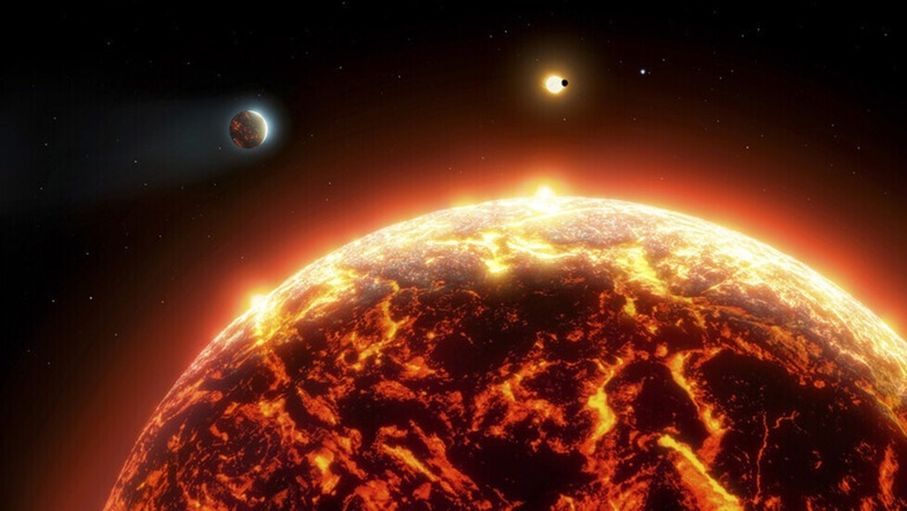
An international team of astronomers has announced a detailed study of a giant exoplanet hot enough to vaporize rocks and rain down molten iron.
Planet WASP-76 b orbits the massive star WASP-76, about 634 light-years away in the direction of the constellation Pisces.
WASP-76 b orbits very close to its parent star, 12 times closer to the Sun than Mercury.
This planet has a mass similar to Jupiter, but is six times larger.
Astronomers looked deep into the exoplanet, where temperatures rise to about 2,400 degrees Celsius (4,350 degrees Fahrenheit), hot enough to vaporize iron. In the process, the team identified 11 chemical elements in the planet’s atmosphere and measured their abundance.
It is noteworthy that some of the elements of the rocks discovered on this distant planet have not yet been measured in the solar system’s gas giants, Saturn and Jupiter.
“It’s rare when an exoplanet hundreds of light-years away can teach us something unknown about our solar system,” Stéphane Pelletier, team leader at the University of Montreal’s Trottier Institute for Exoplanet Research, said in a statement. The case of this study.”
WASP-76 b is classified as a “hot Jupiter,” a massive planet found incredibly close to its star. This gives WASP-76 b, which takes 1.8 Earth days to orbit its star, some other unusual properties.
In a 2020 paper published in the journal Nature, astronomers suggested that one side of the planet may have molten iron, which is permanently opposite the host star, causing orbital locking or tidal control (having a permanent day side and a permanent night side).
This means that the permanent night side of the planet is constantly warm, while the other (permanent day) side is much cooler.
Astronomers estimate the temperature to be over 2,400 degrees Celsius during the day and 1,500 degrees Celsius at night. And the large temperature difference on either side can lead to strong winds. These winds can reach speeds of up to 18,000 km/h and carry elements of the planet’s atmosphere from one side of the planet to the other.
The new observations allowed WASP-76 b to study the formation of “hot Jupiter” in unprecedented detail using the MAROON-X high-resolution optical spectrometer at the Gemini Observatory (or Virgo Observatory) in Hawaii.
Due to WASP-76 b’s impressive temperatures, elements that are rocks in Earth-like terrestrial planets, such as magnesium and iron, vaporize and accumulate as gases in the planet’s upper atmosphere.
This means the new study will give astronomers unparalleled insight into the presence and abundance of rock-forming elements in the atmospheres of the giant planets. This is not possible for cool giant planets like Jupiter, because these elements are so low in the atmosphere that they cannot be detected.
Looking at WASP-76 b, Pelletier and his colleagues found that the abundances of elements such as manganese, chromium, magnesium, vanadium, barium, and calcium not only match their abundances in WASP-76, but also closely match our abundances. the sun
The existence of these elements is not random, because their formation is the result of a large group and billions of years of nucleosynthesis in stars.
According to the University of Montreal, scientists generally measure the same composition of elements in all stars, but the shapes of rocky planets like ours are different because they formed in a slightly more complex way.
This new study shows that WASP-76 b has a similar composition to its star, meaning its composition is similar to that of the protoplanetary disk of material that collapsed at its birth. This may be true for all giant planets.
However, not everything discovered about the formation of WASP-76 b was as expected. The team discovered that Wasp-76b’s atmosphere had “depleted” of certain elements.
The team interpreted this shortcoming as a sign that the composition of the gas giant’s upper atmosphere is sensitive to temperature. Depending on the temperature at which an element condenses, it can either remain a gas in the upper atmosphere or become a liquid and be lost as it sinks into the lower layers of the atmosphere. That element does not absorb light, creating its “fingerprint.” Missing from the observations.
The team made another important discovery about WASP-76 b’s atmosphere, as it contains a chemical compound called vanadium oxide, and is particularly important because this element could have a significant effect on hot giant planets, as it plays the same role. Ozone in Earth’s atmosphere. , which is very effective in warming the upper atmosphere.
The team found more nickel than expected around WASP-76 b, which means that at some point in its history, the giant planet swallowed a small, Mercury-like Earth rich in this element.
The research paper was published in the journal Nature. (Russia Today)

“Professional coffee fan. Total beer nerd. Hardcore reader. Alcohol fanatic. Evil twitter buff. Friendly tv scholar.”






